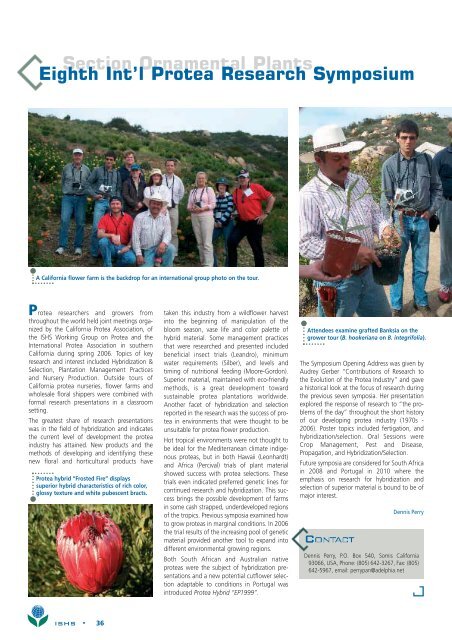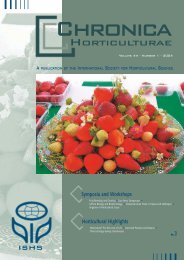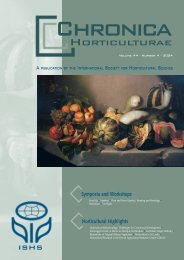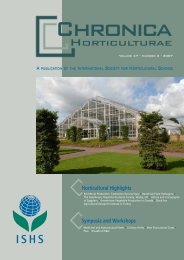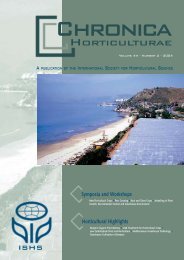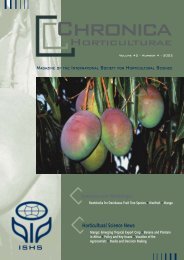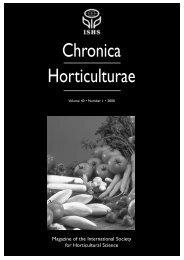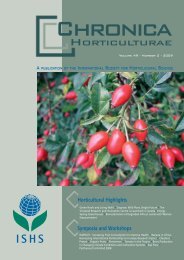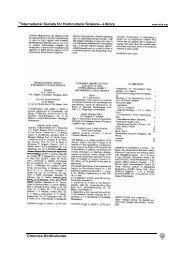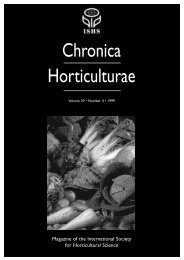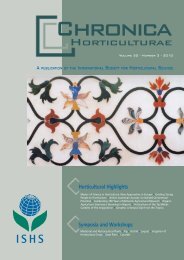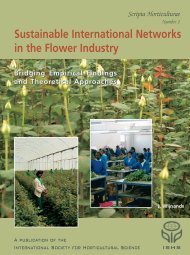Chronica - Acta Horticulturae
Chronica - Acta Horticulturae
Chronica - Acta Horticulturae
Create successful ePaper yourself
Turn your PDF publications into a flip-book with our unique Google optimized e-Paper software.
Section Ornamental Plants<br />
Eighth Int’l Protea Research Symposium<br />
A California flower farm is the backdrop for an international group photo on the tour.<br />
Protea researchers and growers from<br />
throughout the world held joint meetings organized<br />
by the California Protea Association, of<br />
the ISHS Working Group on Protea and the<br />
International Protea Association in southern<br />
California during spring 2006. Topics of key<br />
research and interest included Hybridization &<br />
Selection, Plantation Management Practices<br />
and Nursery Production. Outside tours of<br />
California protea nurseries, flower farms and<br />
wholesale floral shippers were combined with<br />
formal research presentations in a classroom<br />
setting.<br />
The greatest share of research presentations<br />
was in the field of hybridization and indicates<br />
the current level of development the protea<br />
industry has attained. New products and the<br />
methods of developing and identifying these<br />
new floral and horticultural products have<br />
Protea hybrid “Frosted Fire” displays<br />
superior hybrid characteristics of rich color,<br />
glossy texture and white pubescent bracts.<br />
taken this industry from a wildflower harvest<br />
into the beginning of manipulation of the<br />
bloom season, vase life and color palette of<br />
hybrid material. Some management practices<br />
that were researched and presented included<br />
beneficial insect trials (Leandro), minimum<br />
water requirements (Silber), and levels and<br />
timing of nutritional feeding (Moore-Gordon).<br />
Superior material, maintained with eco-friendly<br />
methods, is a great development toward<br />
sustainable protea plantations worldwide.<br />
Another facet of hybridization and selection<br />
reported in the research was the success of protea<br />
in environments that were thought to be<br />
unsuitable for protea flower production.<br />
Hot tropical environments were not thought to<br />
be ideal for the Mediterranean climate indigenous<br />
proteas, but in both Hawaii (Leonhardt)<br />
and Africa (Percival) trials of plant material<br />
showed success with protea selections. These<br />
trials even indicated preferred genetic lines for<br />
continued research and hybridization. This success<br />
brings the possible development of farms<br />
in some cash strapped, underdeveloped regions<br />
of the tropics. Previous symposia examined how<br />
to grow proteas in marginal conditions. In 2006<br />
the trial results of the increasing pool of genetic<br />
material provided another tool to expand into<br />
different environmental growing regions.<br />
Both South African and Australian native<br />
proteas were the subject of hybridization presentations<br />
and a new potential cutflower selection<br />
adaptable to conditions in Portugal was<br />
introduced Protea Hybrid “EP1999”.<br />
Attendees examine grafted Banksia on the<br />
grower tour (B. hookeriana on B. integrifolia).<br />
The Symposium Opening Address was given by<br />
Audrey Gerber “Contributions of Research to<br />
the Evolution of the Protea Industry” and gave<br />
a historical look at the focus of research during<br />
the previous seven symposia. Her presentation<br />
explored the response of research to “the problems<br />
of the day” throughout the short history<br />
of our developing protea industry (1970s -<br />
2006). Poster topics included fertigation, and<br />
hybridization/selection. Oral Sessions were<br />
Crop Management, Pest and Disease,<br />
Propagation, and Hybridization/Selection.<br />
Future symposia are considered for South Africa<br />
in 2008 and Portugal in 2010 where the<br />
emphasis on research for hybridization and<br />
selection of superior material is bound to be of<br />
major interest.<br />
CONTACT<br />
Dennis Perry<br />
Dennis Perry, P.O. Box 540, Somis California<br />
93066, USA, Phone: (805) 642-3267, Fax: (805)<br />
642-5967, email: perrypan@adelphia.net<br />
ISHS • 36


